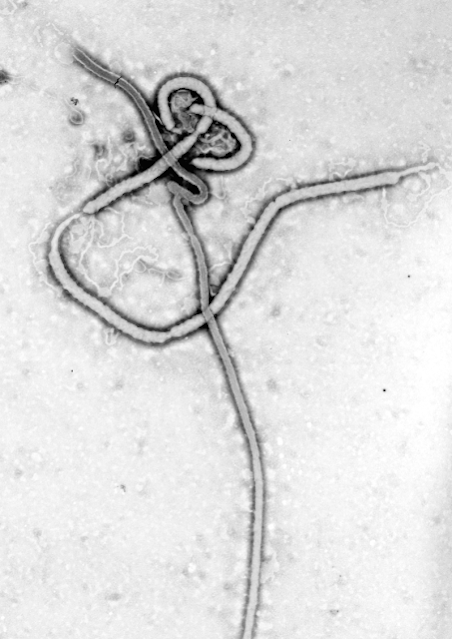A new outreak of Ebola Fever has been reported in Guinea, according to the World Health Organization. On 14 February 2021, the Ministry of Health of Guinea informed the World Health Organization of a cluster of Ebola Virus Disease cases in the sub-prefecture of Gouécké in the Nzérékoré Region of Guinea between 18 January and 13 February 2021. The cases showed symptoms of diarrhea, vomiting and bleeding after attending the burial of another relative (a 51 year-old nurse) on 1 February 2021.
The index case of the cluster was a nurse who had originally presented at a health centre in Gouécké on 18 January 2021 with headache, physical weakness, nausea, vomiting, loss of appetite, abdominal pain, and fever. She was diagnosed with Typhoid. She sought a second consultation at a health facility in Nzérékoré on 23 January 2021 for fever, vomiting, liquid stools, and physical weakness, and she was diagnosed with Malaria. On 24 January she consulted a traditional practitioner in Nzérékoré, and she died on 28 January 2021. She was buried unsafely on 1 February in Gouécké. The other six cases are the five family members and the traditional practitioner she visited.
Among the seven cases, five have died (4 probable and 1 confirmed). The other two confirmed cases are currently in isolation in dedicated health care facilities in Conakry and Gouécké, Nzérékoré region.
The Ebolavirus species has not yet been determined. Additional laboratory analyses are on-going to ascertain Virus species.
As of 15 February, one hundred and ninety-two contacts have been identified, including 164 contacts in N’Zérékoré Health District and 28 in Ratoma Health District, Conakry. To date, no contacts have been reported to have travelled in neighboring countries. However, Nzérékoré is the second-largest city in Guinea and lies at the intersection of roads from Ganta (in Liberia), Danané (Côte d’Ivoire), and roads to other major hubs in Guinea like Kankan and Macenta in (Guinea). Therefore, there is concern about the exportation of Ebola Virus Disease cases into the neighbouring countries.
On 14 February 2021, following the declaration of the Ebola Virus Disease outbreak, the Ministry of Health of Guinea convened a crisis meeting.
The Ministry of Health of Guinea, World Health Organization, and Global Outbreak Alert and Response Network partners, have initiated measures to control the outbreak and prevent further spread. To coordinate the response, the Ministry of Health activated the national and district emergency management committees. They also advised the public to take measures to avert the spread of the disease, and to report any persons with symptoms to seek care. Multidisciplinary teams have been deployed to the field to; actively search and provide care for cases, trace and follow-up contacts, and sensitize communities on infection prevention and control.
Ebola Virus Disease is caused by RNA Viruses of the genus Ebolavirus. It has a reputation for being the world's deadliest viral disease, at least in part due to the 1995 film Outbreak, though this is probably slightly inaccurate as about 50% of victims survive, making it less deadly than diseases such as Rabies. However, it is extremely contagious, with know known cure, and has a tendency to rapidly overwhelm local health systems as health workers themselves are infected.
Ebola begins with a fever similar to that caused by Influenza or Malaria, which tends to come on rapidly two-to-three weeks after infection (during at least part of which time the patient is already infectious). This tends to be followed by extreme respiratory tract infection, headaches, confusion, rashes and tissue necrosis and heavy bleeding. Death is generally caused by multiple organ failure.
The only known treatment for Ebola is intensive rehydration, which can improve the survival prospects of patients greatly, accompanied by anticoagulants and procoagulants to mange the diseases attacks on the circulatory system, analgesia to cope with the pain of the disease and antibiotics and antimycotics to prevent secondary infection. Due to the highly contagious nature of the disease it is recommended that healthcare workers wear full-body protection to maintain a barrier between them and their patients; a daunting prospect in the tropical regions of Africa where the disease is endemic.
Ebolavirus is thought to have a non-human animal vector, since its rapid onset and high mortality rate appears to preclude a permanent residence within Human hosts. Surveys of wild animals have found Ebola infections in Rodents and Great Apes, however these were affected by the disease in a similar way to Humans, and are therefore unlikely permanent hosts. The most likely vectors are thought to be Fruit Bats or small Primates, which are endemic to the areas where the disease occurs and which are widely eaten; cooking meat probably kills the virus, but there is a distinct danger of infection while preparing carcasses.
See also...



Follow Sciency Thoughts on Facebook.
Follow Sciency Thoughts on Twitter.




